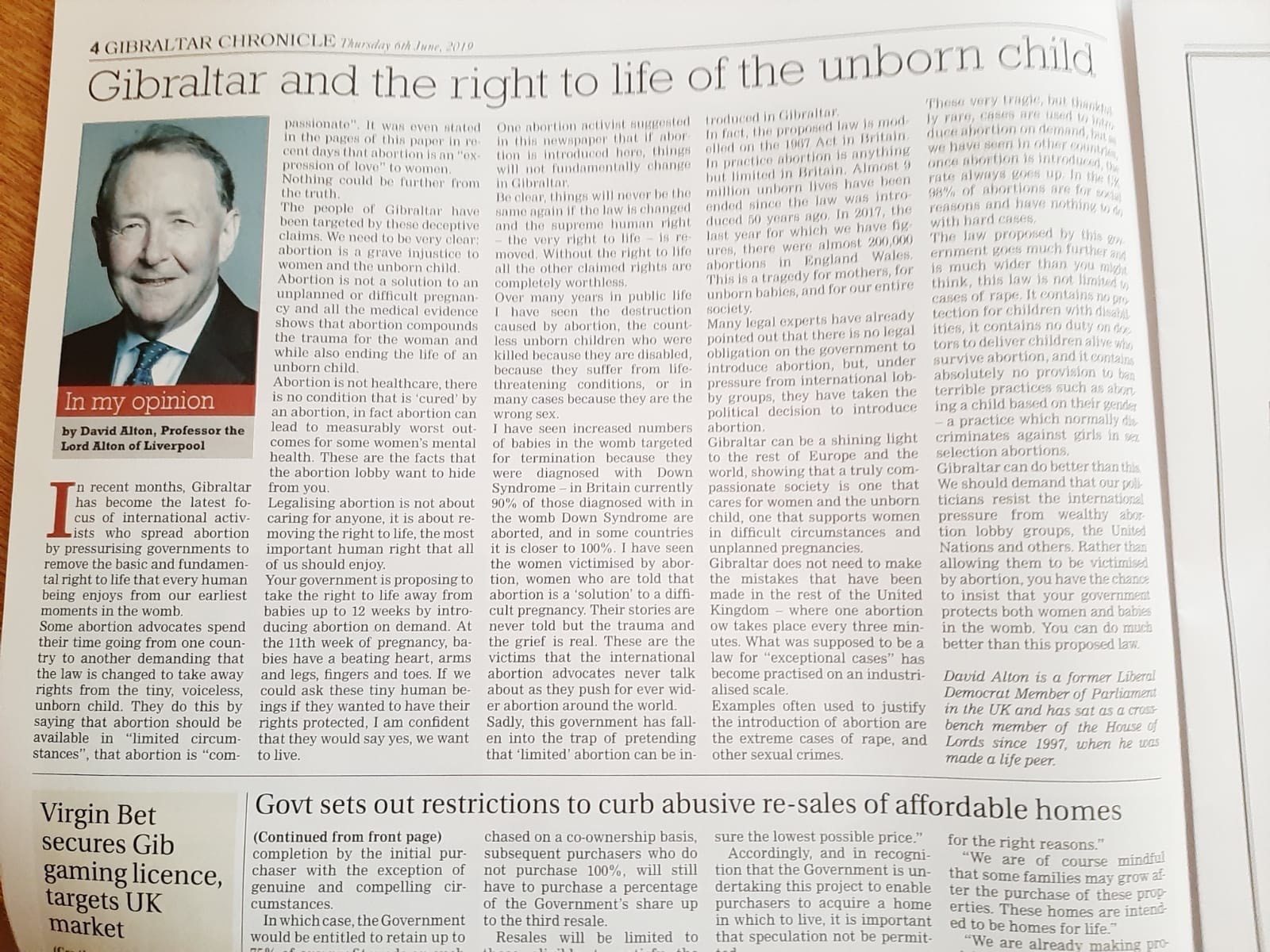


In a referendum on March 19th, Gibraltar is facing a life and death decision.
Should it follow the U.K. – where there have been 9 million abortions, one every three minutes- and legalise the routine taking of life in the womb?
Speaking in Gibraltar today, against a change in the law, I couldn’t help thinking about the Rock’s extraordinary story: its strategic importance, and what Gibraltar has represented across endless pages of history.
During the Second World War, having sailed with thousands of others from Liverpool, my late father came through the Straits of Gibraltar as a young soldier in the Eighth Army.
In 1942 those Desert Rats were on their way to the Battle of El Alamein and to the subsequent Allied invasion of Italy.
For his generation, Gibraltar – the Rock – was the iconic bastion, the fortress which represented Britain’s determination to resist the overwhelming destruction of Europe by fascism. It stood emblematically as a last redoubt in a dark and dangerous time.
Even In antiquity, Gibraltar – one of the two Pillars of Hercules – represented the furthest outpost of the known and civilised world.
Mythology has it that the mother of Hippocrates – the founder of modern medicine- was one of Hercules’ descendants.
Beyond the myth we know that the Hippocratic Oath – with its injunction to do no harm – still forms the bedrock of medicine practised with ethics – but is routinely disregarded by those who have industrialised medicine for reasons of ideology or private gain.
Today, Gibraltar will need all the courage and strength of Hercules if it is to resist their attempts to barbarise its medical services by permitting the destruction of babies in the womb.
Will it stand with Hippocrates and do no harm – compassionately caring for both a mother and her child – or discard the prohibition not to kill?
Gibraltar’s new law (which is already an Act pending approval in the referendum ) effectively allows abortion on demand – as in the U.K.
Lay people and even lawyers reading the proposed new law may think that it has many checks and balances but the UK ‘s experience is that they are not worth the paper on which they are written. That’s why there are 600 abortions every working day in the UK’s charnel houses. It’s why Gibraltar should vote No.
Significantly, there are no time limits in abortions which could be approved by non-specialist doctors e.g. in Section 163 A (1) (b): “if two registered medical practitioners employed by the Gibraltar Health authority are of the opinion, formed in good faith- (b) that the termination is necessary to prevent grave permanent injury to the physical or mental health of the pregnant woman…”
In the U.K. this sort of open ended provision has led to babies with a cleft palate being aborted up to birth- and 90%of babies with Downs Syndrome being aborted.
The Gibraltar law uses a phrase about fatal foetal abnormality – for which there is no agreed definition.
And for other abortions, up to 12 weeks, I would like to hear from legislators what they think happens at 11 weeks, 6 days, 23 hours and 59 minutes that suddenly affords a developing child the right to life, and why that child should be denied protection before this arbitrary point?
Science teaches us that life begins at fertilisation. And science has moved on dramatically since abortion was legalised.
When the UK’s obsolete limits were being set, we didn’t know what was happening in the womb. We do now. This is a law which flies in the face of science and humanity.
We now know so much more about the undeniable humanity of the child in the womb.
It’s all the more clearer that once life begins we should do no harm.
The new law completely disregards increasing evidence about the pain and suffering experienced by the child.
Some legislators in Gibraltar have argued that the UK government would have imposed a wide abortion law on Gibraltar if it doesn’t introduce one itself.
That is simply not true and, in any event, it would be deeply offensive for a territory which rightly boasts of having self-determination to be treated like a 19th century colony of the UK.
Voters in the forthcoming referendum must not think that they are under duress from London – if, it is, then the Gibraltar government should say who in the U.K. is telling it to conform to a law and ethical code which is contested all over the world.
Be clear, neither the UK Supreme Court nor its predecessors in the House of Lords have ever had jurisdiction over Gibraltar and, neither the UK Supreme Court nor the European Court of Human Rights have ever acknowledged the right to abortion.
The 30 Articles of the 1948 Universal Declaration of Human Rights contains no “right” to abortion but it does declare the right to life.
Historically, Gibraltar has always acknowledged the existence of the right to life and the legal protection of the child in the womb by joint operation of Section 6 of the Gibraltar Constitution Order in Council (and its 1969 predecessor) and recital 3 of the UN Declaration of the Rights of the Child.
So, be clear, the central proposition in the forthcoming Referendum is nothing less than the abolition in part of the right to life.
And be clear about the secondary question – whether to capitulate to the powerful international abortion industry which has specifically targeted Gibraltar, the Isle of Man and Malta.
It is surprising that Gibraltar’s government, which prides itself on being robust should have rolled over so easily. Its citizens, though, are renowned for their grit and for remembering the rock from which they have been hewn.
By voting No, Gibraltar will be sending a clear signal that both lives matter- and that it will not be bullied into abandoning its values and ethics.
Globally , the tide is turning, and country after country is questioning the abandonment of the Hippocratic Oath and the industrialised ending of vulnerable fragile lives.
Just as progressive countries are once again rising to the defence of the right to life and legal protection of the most vulnerable, it would be a tragedy if Gibraltar abandoned its historic duty to be a bastion in defence of civilised values and the very right to life itself. On March 19 Gibraltar should vote No.














